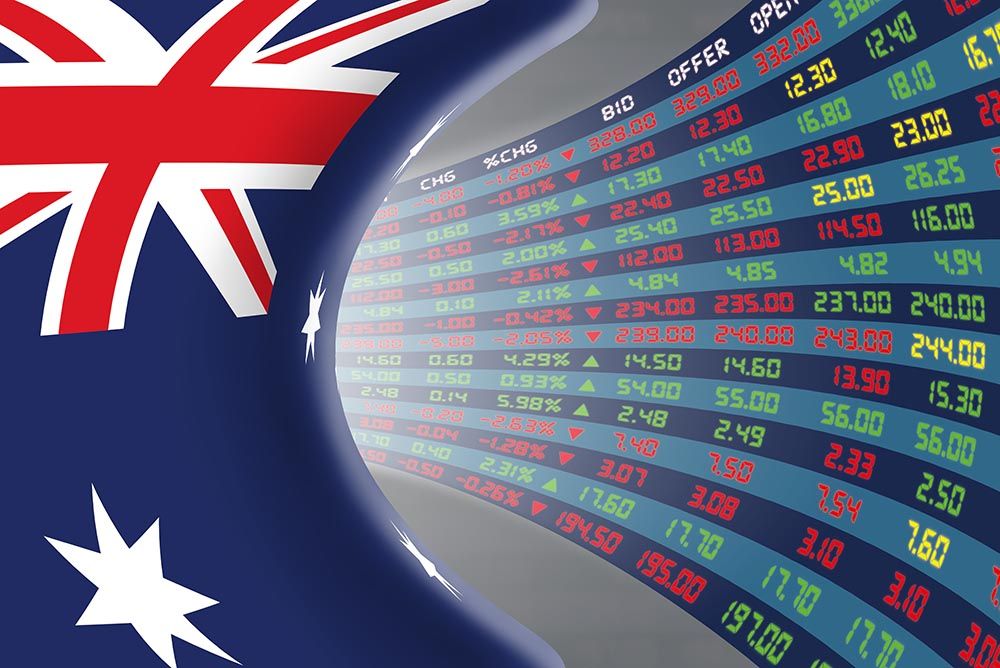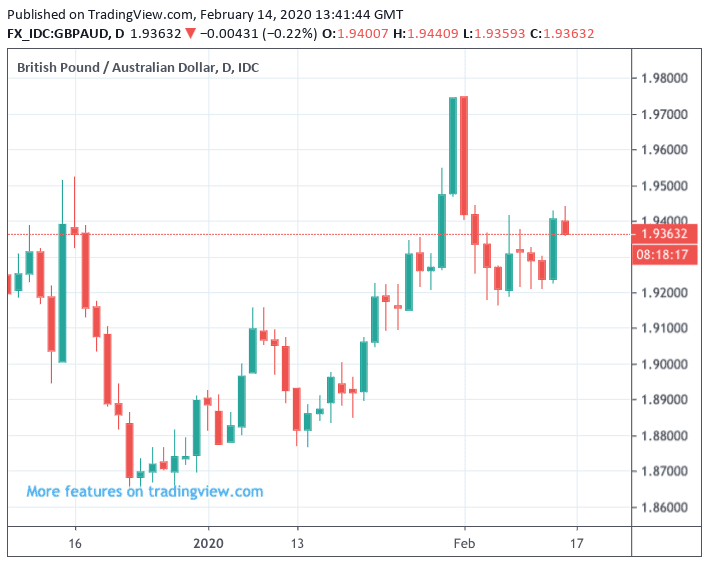Pound-Australian Dollar 5-Day Forecast: Supported at 1.92
- Chinese stimulus aid AUD higher
- But GBP/AUD seen relatively well supported
- Anxieties over coronavirus to limit AUD strength

- GBP/AUD spot rate: 1.9385 -0.1%
- Bank transfer rates (indicative): 1.8706-1.8841
- Specialist money transfer provider rates (indicative): 1.880-1.9210 >> Find out more
The British Pound is likely to remain relatively well supported against the Australian Dollar owing to a constructive technical setup on the GBP/AUD chart and the Australian Dollar's ongoing fragility in the face of the coronavirus outbreak.
The new week nevertheless starts with the GBP/AUD trading a little softer than where it closed the previous week, at 1.9379 amidst some Aussie Dollar strength. The Aussie gained amidst news that the People's Bank of China introduced fresh stimulus measures to try and offset the negative impact to the economy of the coronavirus outbreak. The PBoC offered RMB 200B of one-year MLF loans today, lowering the rate charged by 10bp to 3.15%.
Further support for the economy by Chinese authorities should take some of the sting out of the coronavirus' tail, however it remains to be seen whether the support is in fact enough. "We expect to see a further 10bp cut to the interest rate corridor this quarter, with the PBoC likely to continue rolling over a portion of short-term injections into the longer-term MLF funds," says Freya Beamish, Chief Asia Economist at Pantheon Macroeconomics Ltd. "Banks will be very wary of passing on rate reductions in this environment, despite strong pressure to do so from the authorities."
The market's assessment of the outbreak remains that it will ultimately only deliver a short-lived impact on the Chinese economy and that the ensuing recovery will be rapid; therefore the risks to the Australian Dollar are seen as limited for now.
However, much of China remains in lockdown and it remains too difficult to predict the scale of the outbreak's impact on Chinese economic activity which has knock on implications for Australia.
"We expect a negative impact on the economy of the bush fires and the coronavirus in the near-term. Lower growth in Q4 2019 and Q1 2020 will likely weigh on the Australian Dollar," says Georgette Boele, Senior FX Strategist at ABN AMRO. "Weaker Chinese demand for Australian exports and less tourism will also weigh on the Australian dollar as well expectations of a second rate cut."
China is by far Australia's most important trading partner and we know there have been significant disruptions to the delivery of commodities such as coal and iron ore to China as a result of the coronavirus outbreak. These are Australia's two most important commodity exports and we will be watching for signs of how demand is hitting activity over coming weeks.
In short, there remain a great deal of uncertainties pertaining to China, and currencies dislike uncertainty. Hence, while the Aussie is certainly not in free-fall it will likely remain vulnerable and strength should have its limits until such a time as investors can see the exit from the coronavirus outbreak.
This leaves GBP/AUD remaining relatively well supported and we could see the pair look to eke out further advances over coming days.
The Pound-to-Australian Dollar exchange rate peaked at 1.9747 on February 03, but rapidly fell back from there with losses taking it right back to the February low of 1.9165 as investors bet that the coronavirus was a manageable risk.
However, the pair has yet to close below 1.92 in February, with Sterling finding bidding interest on any declines into this region.
The exchange rate has made 1.92 a base from which it stages rallies, as was the case last week when it bounced back above 1.94 following news that the UK's Chancellor of the Exchequer Sajid Javid had stood aside and was to be replaced by Rishi Sunak.
The bounce in Sterling reflects the market's thinking that the UK's Treasury will feel more inclined to deliver on Prime Minister Boris Johnson's spending promises under Sunak, something that is being tipped to raise economic growth.
The GBP/AUD exchange rate rallied to levels above 1.94 in the ensuing bounce. We therefore forecast the GBP/AUD to remain relatively well supported as long as it remains above 1.92.
However, EU-UK trade negotiations will likely prove to be the key downside risk to Sterling in 2020 and we are wary of any negative headlines impacting on Pound exchange rates.
Trade negotiations will jump back onto the agenda for the Pound with David Frost - the UK's chief Brexit negotiator - expected to say in a lecture in Brussels on Monday evening that the EU’s push to make the UK stick to its rules will reduce the chances of a deal.
Frost will say the UK does not want a unique or special deal, but is merely asking for a copy of the deals the EU has already struck, such as with Canada and South Korea. The UK is "not asking for anything special, bespoke or unique," a spokesperson for the Prime Minister's office told The Times, the UK will set out demands for a "deal like the EU has struck previously with other friendly countries like Canada".
Those countries have virtually tariff-free trade with the EU but do not have to follow EU rules.
Frost is tipped to say the UK's position is that any deal cannot include any regulatory alignment, any jurisdiction for the Court of Justice of the European Union over the UK’s laws, or any supranational control in any area.
The EU is believed to be wanting the UK to commit to alignment on subsidies, comply with its standards on tax and stick to its rules on workers and the environment in order to ensure the UK does not become a competitor.
The significant disagreement between the two sides, before trade negotiations have even officially begun, will keep foreign exchange markets wary of the two sides failing to settle on a deal by the end of 2020.
While the Pound remains one of the better performers of 2020, the risk premium associated with Brexit negotiations will likely ensure Sterling's gains are capped.
"We believe that the GBP will weaken as the problems associated with negotiations with the EU emerge and the end of the transitional period approaches," says Lars Henriksson, Senior FX Strategist at Handelsbanken. "We think that in the end the UK and the EU will most likely agree some sort of a fudge that avoids a disorderly end to the transition period."





